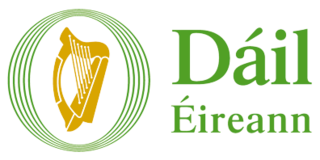
The Ceann Comhairle is the chairperson of Dáil Éireann, the lower house of the Oireachtas (parliament) of Ireland. The person who holds the position is elected by members of the Dáil from among their number in the first session after each general election. The Ceann Comhairle since 18 December 2024 has been Verona Murphy, independent TD.
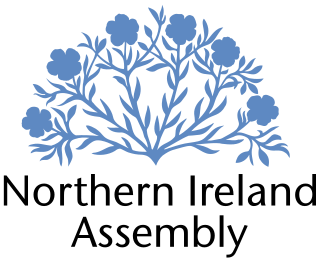
The Northern Ireland Assembly, often referred to by the metonym Stormont, is the devolved legislature of Northern Ireland. It has power to legislate in a wide range of areas that are not explicitly reserved to the Parliament of the United Kingdom, and to appoint the Northern Ireland Executive. It sits at Parliament Buildings at Stormont in Belfast.

The 1929 United Kingdom general election was held on Thursday, 30 May 1929, and resulted in a hung parliament. Ramsay MacDonald's Labour Party won the most seats in the House of Commons for the first time despite receiving fewer votes than the Conservative Party, led by Prime Minister Stanley Baldwin. The Liberal Party, led again by former Prime Minister David Lloyd George, regained some of the ground lost in the 1924 general election and held the balance of power. Parliament was dissolved on 10 May.

Gareth Richard Thomas is a British Labour politician who has served as the Member of Parliament (MP) for Harrow West since 1997. He has served as Parliamentary Under-Secretary of State for Services, Small Business and Exports since July 2024. Thomas served as Minister of State for International Development and Minister of State for Trade, Investment and Consumer Affairs between 2008 and 2010. He was the Chair of the Co-operative Party from 2001 until 2019, and stands for election as a Labour and Co-operative candidate.
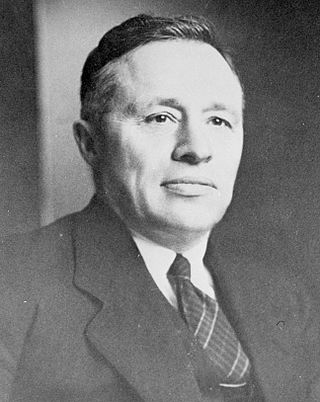
James Garfield Gardiner was a Canadian farmer, educator, and politician. He served as the fourth premier of Saskatchewan and as a minister in the Canadian Cabinet.
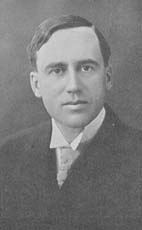
The 1921 Saskatchewan general election was held on June 9, 1921, to elect members of the Legislative Assembly of Saskatchewan.
National University of Ireland (NUI) is a university constituency in Ireland, which elects three senators to Seanad Éireann, the senate of the Oireachtas. Its electorate is the graduates of the university, which has a number of constituent universities. It previously elected members to the House of Commons of the United Kingdom (1918–1921), to the House of Commons of Southern Ireland (1921) and to Dáil Éireann (1922–1937).
Parliamentary by-elections in the United Kingdom occur when a Member of Parliament (MP) vacates a House of Commons seat during the course of a parliament.
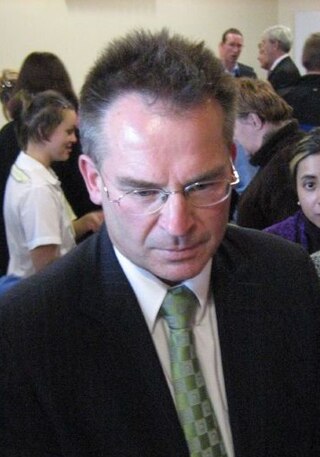
Elections to the Australian Capital Territory Legislative Assembly were held on Saturday, 16 October 2004. The incumbent Labor Party, led by Jon Stanhope, was challenged by the Liberal Party, led by Brendan Smyth. Candidates were elected to fill three multi-member electorates using a single transferable vote method, known as the Hare-Clark system.

Damian Patrick George Hinds is a British Conservative Party politician who has been Member of Parliament (MP) for East Hampshire since 2010. He previously served as Secretary of State for Education under Theresa May from 2018 to 2019; he has also held junior ministerial positions under four Prime Ministers.
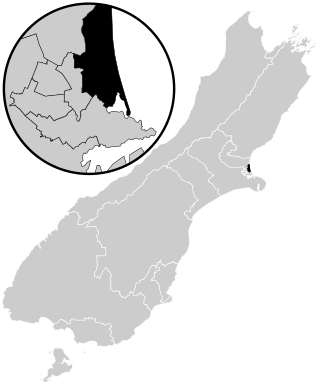
Christchurch East, originally called Christchurch City East, is a current New Zealand parliamentary electorate. It was first created for the 1871 election and was abolished for two periods, from 1875–1905 and again from 1946–1996. It was last created for the introduction of the MMP voting system for the 1996 election. The current MP is Reuben Davidson, a member of the New Zealand Labour Party who was first elected in the 2023 New Zealand general election.

Elections to the Australian Capital Territory Legislative Assembly were held on Saturday, 18 October 2008. The incumbent Labor Party, led by Jon Stanhope, was challenged by the Liberal Party, led by Zed Seselja. Candidates were elected to fill three multi-member electorates using a single transferable vote method, known as the Hare-Clark system.

The London mayoral election for the office of mayor of London takes place every four years. The first election was held in May 2000, and six subsequent elections have taken place. The latest mayoral election took place in 2024.

The leader of the Labour Party is the highest position within the United Kingdom's Labour Party. The current holder of the position is Prime Minister of the United Kingdom, Keir Starmer, who was elected to the position on 4 April 2020, following his victory in the party's leadership election.
The Mayor of Bedford is a directly elected mayor responsible for the executive function, and ceremonial duty of Bedford Borough Council in Bedfordshire. The incumbent is Tom Wootton of the Conservative Party, elected in May 2023.

The 2016 National Assembly for Wales election was held on Thursday 5 May 2016, to elect members (AMs) of the National Assembly for Wales, now known as the Senedd. It was the fifth election for the National Assembly, the third election taken under the rules of the Government of Wales Act 2006 and the first since the Wales Act 2014.

Elections of police and crime commissioners in England and Wales were held on 5 May 2016.














